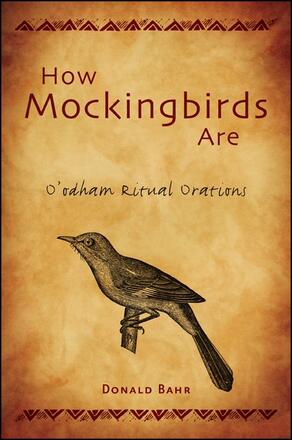
How Mockingbirds Are
O'odham Ritual Orations
Alternative formats available from:
Brilliant analysis of the power of ritual orations in a southwestern American Indian community.
Description
The power of mockingbirds and the enduring significance of indigenous ceremonial speeches are deftly revealed in this brilliant analysis of ritual orations created and delivered by the O'odham people (also known as the Pima-Papago). Making their homes along the Akimel rivers and across the arid expanses and mountains of the desert of southern Arizona and northern Sonora, the O'odham people traditionally lived in small villages with scattered brush-walled round houses. Public ceremonies involved many villages and centered around small brush-walled "rainhouses. "
One hundred years ago, two very different versions of a speech delivered during rain ceremonies were heard at these rainhouses. The Pimas (Akimel O'odham) told of nearly silent and stately events—the calming of a heaving earth, the building of a house on the stilled land, the breathing out of smoke, and the coming of gentle rain. In marked contrast, the Papagos (Tohono O'odham) told of how raucous, drunken people caused clouds to rise and explode with rain like vomiting drunks. Both stories featured mockingbirds and both involved the coming of rain. Today, the gentler, Pima version is extinct while the wilder Papago story endures.
Why? Drawing upon a rich reservoir of O'odham oral traditions and ceremonial performances, a meticulous deciphering of particular texts, and an insightful assessment of the impact of Christianity upon the O'odham people, Donald Bahr offers a brilliant analysis of why some indigenous stories cease to be relevant and told. The clues lie in the very different trajectories of the Pima and Papago communities in the late nineteenth and twentieth centuries, trajectories resulting in part with how Christianity fared in the respective communities.
Donald Bahr is Professor Emeritus of Anthropology at Arizona State University at Tempe. He has published several books, including O'odham Creation and Related Events: As Told to Ruth Benedict in 1927; Piman Shamanism and Staying Sickness; Short Swift Time of Gods on Earth: The Hohokam Chronicles; and Ants and Orioles: Showing the Art of Pima Poetry.